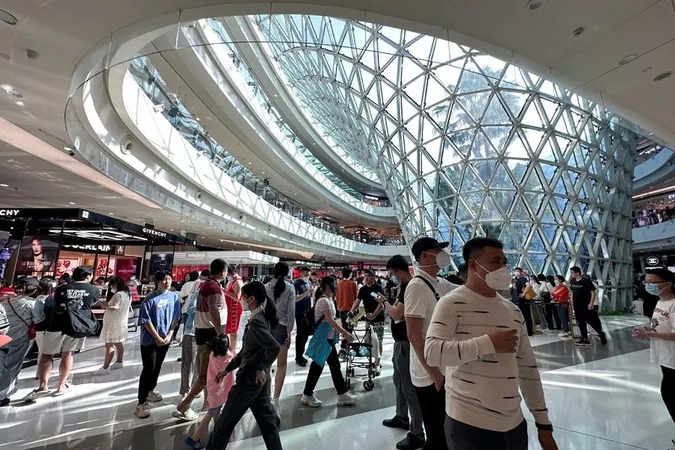
Hainan's Duty-Free Shopping Decline: What it Means for Luxury Brands and China's Future
2025-01-03
Author: Siti
Hainan's Economic Downturn
BEIJING - Hainan, often hailed as China's shopping paradise, is experiencing a dramatic downturn in duty-free spending, which plummeted by an astonishing 29.3% last year. This significant decline has been attributed to a sluggish economy and a stark reduction in domestic tourists visiting the island.
Declining Sales and Visitor Numbers
According to data from local customs, shoppers in Hainan spent approximately 30.94 billion yuan (around $4.24 billion) on duty-free goods in 2024—a stark contrast to previous years. The influx of shoppers dwindled as well, with the number of visitors dropping by 15.9%, down to 5.683 million compared to 6.756 million in 2023.
Challenges for Luxury Brands
This downturn poses a considerable challenge for foreign luxury brands such as LVMH and Kering, which had been banking on a post-pandemic revival in sales. In a surprising turn, sales had surged to 43.76 billion yuan in 2023, tripling since 2019 thanks to a 2020 policy change that lifted duty-free purchase limits at Hainan's 12 duty-free malls. The current drop, however, signifies a stark shift in trends that could impact their future strategies.
Future of Duty-Free Shopping in Hainan
Plans to transform Hainan into a fully-fledged duty-free shopping zone by 2025 are now in jeopardy. The transformation would enable brands to operate their own duty-free stores, moving away from partnerships with local entities like the China Duty Free Group. This ambitious initiative was intended to rival international duty-free hotspots such as Jeju Island in South Korea, with hopes of diverting Chinese consumers back to domestic shores.
Changing Consumer Trends
Moreover, the recent trend of 'revenge spending,' which saw a brief surge in consumer expenditure post-COVID lockdowns, seems to be waning. By the second half of 2024, domestic consumption resumed a lower growth trajectory, with November seeing an increase of just 3.0% in retail sales year-on-year—far below analysts' expectations of a 4.6% rise.
Looking Ahead
In light of these developments, key officials from China’s ruling Communist Party are advocating for a vigorous push to promote consumption throughout the country in 2025, aiming to bolster domestic demand across various sectors.
As the luxury market braced for what was expected to be a golden era, the collapsing shopping spree in Hainan raises challenging questions about the future of consumer behavior in China and its implications for brands heavily invested in the region. Only time will tell how these trends will evolve and their effect on Hainan's reputation as a premier shopping destination.
 Brasil (PT)
Brasil (PT)
 Canada (EN)
Canada (EN)
 Chile (ES)
Chile (ES)
 Česko (CS)
Česko (CS)
 대한민국 (KO)
대한민국 (KO)
 España (ES)
España (ES)
 France (FR)
France (FR)
 Hong Kong (EN)
Hong Kong (EN)
 Italia (IT)
Italia (IT)
 日本 (JA)
日本 (JA)
 Magyarország (HU)
Magyarország (HU)
 Norge (NO)
Norge (NO)
 Polska (PL)
Polska (PL)
 Schweiz (DE)
Schweiz (DE)
 Singapore (EN)
Singapore (EN)
 Sverige (SV)
Sverige (SV)
 Suomi (FI)
Suomi (FI)
 Türkiye (TR)
Türkiye (TR)
 الإمارات العربية المتحدة (AR)
الإمارات العربية المتحدة (AR)